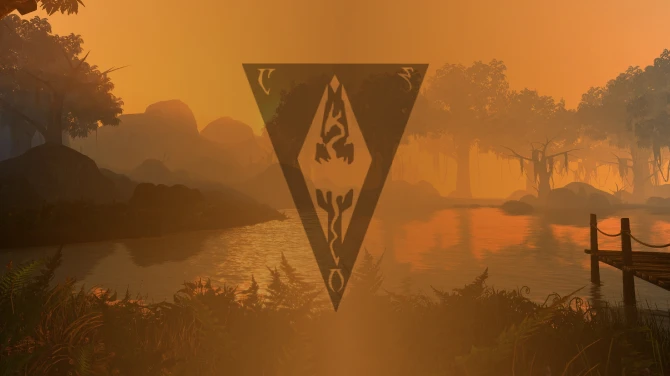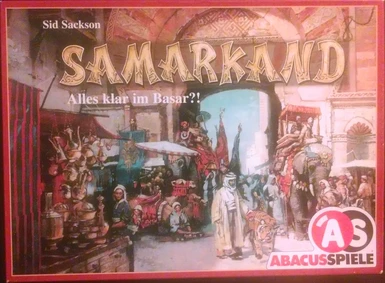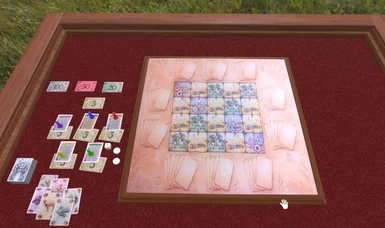Documentation
Readme
View as plain text
Samarkand
To load Samarkand, begin a new, custom board.
Input the fields as required, noting that the first sheet of cards is 60 cards, the second is 42 cards, the third is 5 cards, the fourth is 18 cards, the fifth is 12 cards, the sixth is 14 cards, the seventh is 10 cards, and the eigth is 12 cards.
Alternatively, you can copy the provided .cjc file into your Documents/My Games/Tabletop Simulator/Saves/ folder and simply load the save.
Note: You may need to adjust the number in the filename of your copy of the save file. To do this, simply change the "5" to the next available number in your folder.
Preparation:
When paying with fewer than 5 players,
reduce the numbers of commodity cards to:
- with 4 players remove 1 of each commodity
- with 3 players remove 3 of each commodity
- with 2 players remove 5 of each commodity
Shuffle the commodity cards and place 2 cards
face up in each of the ten trading fields
(4, 5, and 6) on the border of the board.
Sort the play money by value and place it beside
the board. Place the die and the market chips near
the board.
Each player takes a game figure, 200 Piaster (money),
and a price table. Choose one player to be dealer;
that player deals 7 commodity cards to each player
face down. These cares are the player's starting hands.
The dealer places the remaining cards face down near the
board. This is the commodity deck.
The oldest player begins by placing his game figure on
any one of the 20 spaces on the board. In clockwise order,
the other players follow suit and place their game figures
on the game board. More than one player may start in the
same space. The oldest player then takes the die and begins
play; the others will follow in clockwise order.
Winning the game:
The first player to have 500 Piaster, wins the game.
Playing the game:
The players are merchants traveling the routes shown by the
red arrows. With the Nomads they can trade the goods they
have for those they want, in the oases they can buy new goods
and in the bazaars of the large cities they can sell their
goods for great profits.
The more goods of one kind a player sells, the more money can
be earned. With some luck when buying and skill when trading,
a player will do well. A player who visits a Nomad camp with a
full trading field will have a great opportunity.
The game board:
Thwe board has 3 types of spaces:
- the NOMAD camps (10), where goods are traded,
- the OASES (6) where goods can be purchased, and
- the CITIES (4) where goods can be sold.
Each Nomad camp has a value of 4, 5, or 6 and has a trading field
for the same number of cards at the edge of the board. The trading
fields are connected to the Nomad camps by arrows and also show the
numbers 4, 5, or 6 next to them.
Nomad camps:
When a player enters a Nomad camp, he must place a card from his
hand (as a greeting gift) on the trading field for that camp. After
giving the greeting gift, the player may trade cards from his hand
for those available at the Nomad camp. To do so, the player simply
takes a card from the trading field for that Nomad camp and places
one from his hand in its place. The player may make as many trades
as he wishes.
If a Nomad camp already contains the maximum numbers of cards
(4, 5, or 6), the player must pay 10 Piaster and takes all the
commodity cards, which he adds to his hand. As at the beginning of
the game, he then draws two cards and places them face up in the
trading field for that camp.
Example: Ali enters a Nomad camp that has three goods cards
(2x jewels, 1x grain). As greeting gift he offers 1 fruit. Then he
trades 1 copper for a jewel and 1 carpet for the second jewel. The
trading field for this Nomad camp is now full with four cards
(1x grain, 1x copper, 1x fruit, 1x carpet). The next player who
enters this space, must buy all four cards for 10 Piaster, but
does not give a greeting gift.
Penalty:
If a player enters a Nomad camp and has no cards to deliver as a
greeting gift, he must draw the top card from the commodity deck,
pay 20 Piaster to the bank and then give the card to the Nomads as
a greeting gift.
Oasis:
When a player enters an oasis, he must buy 1 or 4 cards at the
prices indicated. He pays the money to the bank and draws 1 or 4
cards from the commodity deck.
Penalty:
If a player enters an oasis and does not have sufficient money to
buy even a single card, he must give up three of his cards. The
player on his right chooses the three randomly from his hand. The
cards are immediately shuffled into the commodity deck. If he has
fewer than three cards, he loses all of his cards.
Cities:
When a player enters a city, he must sell them at least two cards of
one of the two commodities they will buy, if he can. The player
decides which of the two markets (he may only sell to one on each trip
to the city) in the city he will sell to. The price table shows the
prices the city (the bank) will pay for different numbers of goods.
Cards sold are shuffled into the commodity deck.
Example: If a player sells 5 grain, the grain market will pay 40 Piaster.
If a player sells 6 camels, the camel market pays 180 Piaster.
Two of the market tokens show a gate elbow symbol. Such a market will
only buy an assortment of the goods. In fact, they will buy just one of
each good.
Example: For 1 grain, 1 fruit and 1 jewel they pay 15 Piaster.
After a sale, the player covers the corresponding symbol with one of the
chips. If there is a chip available off the board, he should use this one.
If both chips are on the board, the player chooses one to move. When a
good with its symbol covered by a chip is sold, the bank pays one price
level less.
Example: The symbol of grain is covered by a chip. A player sells 5 grain
but receives only the price of 4 grain. He gains just 20 Piaster instead of
40.
Penalty:
If a player enters a city and cannot sell the items the city's market will
buy, he must immediately show all his cards to the other players to prove
that he cannot sell. If they determine he can sell, he must. If he still
cannot sell, he pays 20 Piaster to the bank and takes back all his cards.
Movement:
On a player's turn he must decide from one of 3 possible moves:
One space free of charge:
The player may move his figure exactly one space in the direction of the
arrows for no cost. He then takes whatever action(s) allowed or required in
the space he has reached.
Free move to nomad camp with extra move:
This is similar to the "One space free of charge" described above. With this
move, the player's free move takes his to a Nomad camp. There, after giving
a greeting gift, the player decides not to trade. Since he has not traded,
he is afforded an additional free move in the direction of an arrow. If he
enters another Nomad camp, he may do the same thing again after giving a
greeting gift. When he finally ends his movement, he then takes whatever
action(s) allowed or required in the space he has reached.
Dice for 5 Piaster:
The player pays 5 Piaster to the bank and rolls the die. The player then
moves exactly the number of spaces indicated on the die. He may only move in
the direction indicated by the arrows. If his move ends on a Nomad camp he
is not allowed to use the "Nomad camp extra move". He then takes whatever
action(s) allowed or required in the space he has reached.
When the number 6 is rolled, the player must move backwards (against the
arrows) one space. When the arrows offer more than one choice, the player
chooses which space to move to. He then takes whatever action(s) allowed or
required in the space he has reached.
No more commodities:
When the last commodity card is drawn, each player must immediately reduce
the number of cards in their hand to 12 by discarding any over that number.
Shuffle the discarded cards to form a new commodity deck. The reduction also
occurs for cards just drawn.
After shuffling the commodity deck, the interrupted move should be completed
if it was incomplete when the deck ran out. That is, one more card has to be
placed on a Nomad Camp trading field or a player continues drawing cards
bought in an oasis.
Game end:
The game ends as soon as a player reaches 500 Piaster. Only cash counts;
commodities in a player's hand have no value when counting a player's cash
for the purposes of winning the game.











